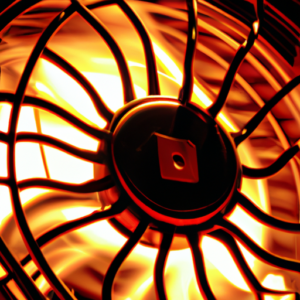Welcome to the World of Overclocking: Where Speed is King!
Hey guys, I’m excited to talk to you about overclocking your PC. If you’re unfamiliar, overclocking is the process of boosting your computer’s performance by increasing the clock speed of your processor. This can result in faster load times, smoother gaming experiences, and quicker overall computing power.
Now, I know some people might be hesitant about overclocking because they’ve heard it can cause problems. But let me tell you, the benefits far outweigh the risks if done correctly.
So, why overclock? Well, for starters, it’s a cost-effective way to get more power out of your computer without having to invest in expensive new hardware. It also allows you to make the most out of your existing PC, so you don’t have to spend money on a new system just to keep up with the latest technology.
What’s Cooking My Computer? The Real Causes of Heat Issues
Hey there, fellow tech enthusiasts! You might have noticed that your computer is running hotter than usual lately. Before you start panicking and thinking about expensive repairs, let’s take a closer look at the top culprits of heat issues in PCs.
Dust Buildup
Believe it or not, your PC can get dusty over time, even if you diligently clean your home. Dust particles trap heat and obstruct airflow, causing your system to overheat. I recommend opening your computer case and using compressed air to blow away dust from your fans, heatsinks, and other components at least once every six months.

Did you know that a faulty power supply unit can cause overheating? If your PSU is not providing enough power, your computer’s components will draw more current to compensate for the lack of supply, leading to higher operating temperatures. Consider upgrading to a higher wattage PSU if you suspect yours is not up to par.
Poor Case Ventilation
Your computer case plays a crucial role in keeping your components cool. If your case has poor ventilation or inadequate fans, hot air will get trapped inside, raising the temperature of everything inside the case. I suggest investing in more fans or a new case with better airflow to improve overall cooling.
Steps to Overcome Heat Issues
Okay, so we’ve talked about the causes of heat issues with PCs, and now it’s time to get to the good stuff – how to overcome those pesky heat problems! Here are a few steps you can take to keep your system running cool:
Cleaning the System
First and foremost, make sure your system is clean! This means opening up your PC and dusting out any buildup that may be clogging up your fans or vents. You don’t want to be breathing in all those dust bunnies, and your system doesn’t want to be suffocating from lack of air flow.
Installing Better Cooling Components
If cleaning your system doesn’t solve the issue, it may be time to upgrade your cooling components. This could mean anything from adding more case fans, to installing a liquid cooling system, or even switching out your stock CPU cooler for a more efficient one. It all depends on the specific needs of your system, so do your research and make an informed decision based on your budget and requirements.
Adjusting BIOS Settings
Another option is to adjust your BIOS settings. This can be a bit more technical, but it could make a big difference in your system’s temperature. Some settings to consider tweaking include your CPU voltage and speed, as well as your fan speeds. Just be careful not to mess with anything you’re not sure about – you don’t want to accidentally fry your system!
By taking these steps, you can help prevent your PC from overheating and potentially causing permanent damage. Remember, a little maintenance goes a long way when it comes to keeping your system running smoothly!
Conclusion: Time to Get Overclocking!
Well folks, there you have it! We’ve covered everything there is to know about PC overclocking and how to deal with heat issues that can arise from it. Are you ready to start squeezing every last drop of performance out of your PC?
Remember that overclocking can be a great way to improve your system’s speed and performance, but it’s not without its risks. Make sure you understand the process and take the necessary precautions before diving in.
If you do decide to overclock, don’t forget to keep an eye on your system’s temperature. Heat can be your worst enemy, but with the right cooling components and good system maintenance, you can easily overcome it.
So, get out there and start experimenting! There’s a whole world of performance waiting to be unlocked.